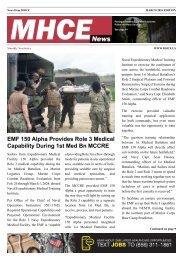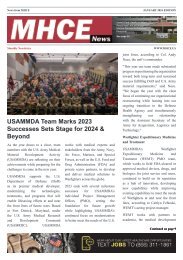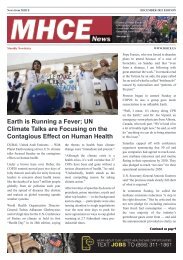July 2022 — M2CC Newsletter
You also want an ePaper? Increase the reach of your titles
YUMPU automatically turns print PDFs into web optimized ePapers that Google loves.
WWW.<strong>M2CC</strong>.US Monthly <strong>Newsletter</strong> | 15<br />
They took such good care of me,”<br />
she said of the clinic staff.<br />
Their grief still runs deep.<br />
"No one expects it will ever happen<br />
to them. If it does, they should have<br />
a choice," she said. "I've always<br />
been pro-choice. But now I'm 12<br />
times more pro-choice."<br />
She said the Supreme Court’s<br />
decision to overturn the landmark<br />
abortion rights ruling made her<br />
angry, sad and scared.<br />
“We live in a blue state now, but<br />
who knows where they’ll send us?”<br />
she said.<br />
In 1976, three years after Roe v.<br />
Wade legalized abortion up to fetal<br />
viability, the Hyde Amendment<br />
banned the use of federal funds for<br />
most abortions in the United States.<br />
For years, the only abortions the<br />
military would facilitate were those<br />
for pregnancies that posed a threat<br />
to the mother's life. Rape and incest<br />
exceptions were added in 2013.<br />
Severe and fatal abnormalities of<br />
the fetus were never covered. For<br />
Wald and her Marine husband, that<br />
led to a nightmarish experience in<br />
Japan.<br />
hospital emergency room diagnosed<br />
her with a lacerated cervix and<br />
blood poisoning and started her on<br />
intravenous antibiotics, she said.<br />
Later that day, doctors decided to<br />
induce labor. Her newborn son<br />
weighed less than 13 ounces, she<br />
said.<br />
"I ended up having a compassionate<br />
birth after being in a situation<br />
nobody wants to be in," she said,<br />
lauding the empathy the Navy<br />
doctors and nurses showed her.<br />
Seven years passed before Wald<br />
could talk about the ordeal with<br />
anyone other than the thousands<br />
of women she found in a private<br />
Facebook group who had undergone<br />
similar tragedies.<br />
Now the mother of two, Wald said<br />
her trauma had broadened her<br />
support for abortion rights.<br />
“It definitely made me more<br />
empathetic to the whole spectrum<br />
of why women get abortions,” she<br />
said. "Now I'm loud and proud.<br />
It's not about me. It's about my<br />
daughter.”<br />
Lauren Bryar said she and her<br />
husband, a Defense Department<br />
civilian, were blindsided several<br />
years ago when they learned at 23<br />
weeks' gestation that the fetus she<br />
was carrying had several genetic<br />
abnormalities that would have<br />
rendered their child profoundly<br />
disabled.<br />
Bryar has multiple sclerosis; her<br />
husband has diabetes. Their son,<br />
then 2 years old, is autistic. They<br />
agonized but they knew they<br />
couldn't care for a child with needs<br />
so great.<br />
“It was never a decision I thought<br />
I’d make or that I wanted to make,”<br />
she said. “I was at a point in my<br />
life where I’d say, ‘Of course I’m<br />
pro-choice, but I would never have<br />
an abortion.’ Now I cringe when I<br />
think of it.”<br />
Tricare wouldn’t pay for the<br />
abortion, but her private insurance<br />
did. The military’s refusal to cover<br />
abortion for fatal fetal abnormalities<br />
has been upheld in at least two<br />
federal court cases.<br />
Federal judges ruled in separate<br />
cases in 2002 that the military was<br />
required to pay for the abortion of<br />
anencephalic fetuses, according<br />
to a 2013 Congressional Research<br />
Service report. Both rulings were<br />
reversed on appeal.<br />
According to the ruling of one of<br />
those appellate courts, the Supreme<br />
Court had decided in a 5-4 ruling<br />
that the right to abortion does not<br />
include "a constitutional entitlement<br />
to the financial resources" necessary<br />
to exercise that right.<br />
Continuing such high-risk<br />
pregnancies can endanger a<br />
woman’s health even more than<br />
an uncomplicated pregnancy in<br />
the U.S., which has a far higher<br />
maternal mortality rate than other<br />
high-income nations, according to<br />
the Centers for Disease Control and<br />
Prevention.<br />
Carrying a dying fetus to term<br />
is potentially lethal and can also<br />
severely harm a woman's mental<br />
health, doctors say.<br />
Five states with abortion bans<br />
<strong>—</strong> South Carolina, Louisiana,<br />
Utah, Mississippi and Georgia <strong>—</strong><br />
allow some exceptions for severe<br />
fetal defects, according to the<br />
Guttmacher Institute, a research<br />
group that supports abortion rights.<br />
Only two abortion-banning states,<br />
Utah and South Carolina, make<br />
exceptions for rape or incest, cases<br />
in which the military has vowed to<br />
provide access.<br />
After amniocentesis tests came<br />
back positive for severe fetal<br />
abnormalities, Wald was handed a<br />
pamphlet for a Japanese hospital.<br />
When they got there, they were<br />
told the procedure would take place<br />
overnight and cost $5,000 cash up<br />
front.<br />
The doctor examined her roughly,<br />
she said, using a glove from his<br />
pocket that reeked of cigarettes. As<br />
the procedure began, the pain was<br />
unbearable and she started bleeding<br />
profusely.<br />
She called her best friend, an<br />
ICU nurse in Arizona, to describe<br />
what was happening. The friend<br />
conferred with an obstetrician then<br />
told her, "You need to leave that<br />
place. It's not safe."<br />
At home early the following<br />
morning, Wald awoke weak with a<br />
105-degree temperature. The Navy


















